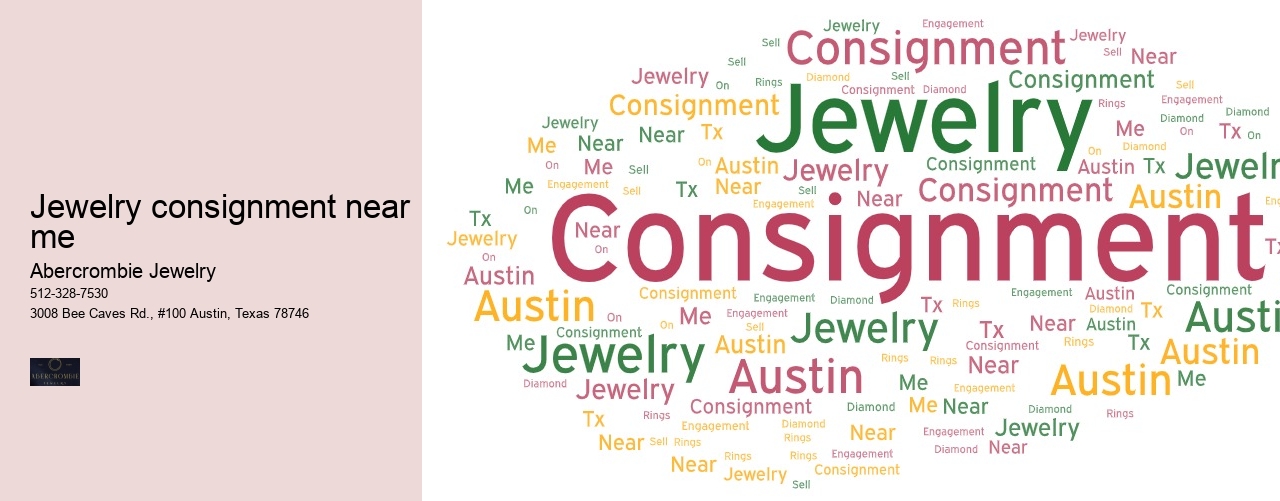

Consignment Jewelry Services - Abercrombie Jewelry, Austin, TX
For over 30 years, Abercrombie Jewelry in Austin, TX, has been the trusted choice for consignment jewelry services. Specializing in fine jewelry, luxury watches, and estate pieces, we offer clients a seamless way to showcase and sell their treasures. Our expertise and dedication to professionalism ensure you get the maximum value for your items while enjoying a stress-free consignment process.
Why Consign with Abercrombie Jewelry?
Choosing Abercrombie Jewelry means benefiting from our industry knowledge and established reputation. We specialize in presenting and marketing high-value jewelry to the right buyers. Here’s what you can expect:
Certified Appraisals: Our gemologists provide precise evaluations to set the ideal market price.
Broad Buyer Network: Gain access to our extensive network of collectors and buyers.
Showcasing Expertise: We clean, restore, and display your pieces to highlight their value.
Clear Communication: Stay informed at every stage with transparent terms and fair commission rates.
What We Accept
We consign a wide variety of high-quality items, including:
Diamond and gemstone jewelry
Antique and estate pieces
Designer jewelry from brands like Tiffany & Co., Cartier, and David Yurman
Luxury watches by Rolex, Omega, Patek Philippe, and more
The Consignment Process
Evaluation: Bring your items to our Austin store for a detailed assessment.
Agreement: Once terms are agreed upon, your jewelry is prepared for display and marketing.
Sale: After your piece is sold, we’ll notify you and promptly process your payment.
Why Choose Abercrombie Jewelry?
Abercrombie Jewelry is committed to trust, integrity, and customer satisfaction. We take pride in providing exceptional service and ensuring a rewarding experience for every client.
Visit us at 3008 Bee Caves Rd #100, Austin, TX, or call (512) 328-7530 to schedule an appointment. Discover how Abercrombie Jewelry can turn your cherished jewelry into valuable assets.
Consignment jewelry involves a partnership between the owner of the jewelry and a consignee, typically a shop or boutique, who agrees to sell the jewelry on their behalf. The owner retains ownership of the item until it is sold. This arrangement can be particularly beneficial for individuals looking to sell unique, vintage, or high-end pieces that may attract more buyers in a specialized retail environment.
Before any jewelry is displayed for sale, both parties will enter into a consignment agreement. This legal document outlines the terms and conditions of the consignment, including the percentage of the sale price that will go to the consignee as commission, pricing strategy, how long items will be held before being returned unsold, and responsibilities for loss or damage while in possession of the consignee.
When preparing to consign your jewelry, it's important to ensure each piece is in excellent condition. This might involve cleaning and minor repairs. Presenting your items at their best increases their appeal to potential buyers and can positively affect their appraised value. Some consignment shops might assist with this process but be aware that there could be additional fees involved.
Determining an appropriate selling price is crucial in consignment. Prices are typically based on factors such as original retail value, brand recognition, material quality, design complexity, current fashion trends, and overall market demand. It's common practice for both parties to agree upon pricing after careful research; however final pricing may also take into account the shop’s clientele and location.
While most consignment shops have established customer bases and marketing strategies that include displaying your jewelry prominently within their store or online platform; some may go further with special promotions or events specifically tailored towards showcasing consigned items. It's essential to discuss how extensively your pieces will be marketed during initial negotiations.
Upon sale of an item, payment processes are dictated by terms set out in the initial agreement—this could mean immediate payment once funds clear from buyer transactions or scheduled payouts at regular intervals throughout the contract period. After a successful sale and settlement of accounts between you (the consignor) and them (the shop), any unsold pieces can either be reclaimed by you according to contract stipulations or renegotiated for extended time within their inventory.
View Abercrombie Jewelry | Consignment Jewelry Services in a full screen map
| Entity | Definition |
|---|---|
| Sell Jewelry on Consignment Near Me | Local consignment services that help individuals sell their pre-owned jewelry for a percentage of the profit. |
| Jewelry Consignment | The process of selling vintage or pre-loved jewelry through a third-party store or platform. |
| High-End Jewelry Consignment | Exclusive designer or luxury jewelry items sold through consignment services. |
| Costume Jewelry Consignment Near Me | Nearby consignment shops that specialize in fashion and costume jewelry items. |
| Wedding Ring Consignment | The sale of pre-loved wedding rings through consignment stores or online platforms, often with appraisals included. |
When jewelry designers or sellers opt to place their items in a store or gallery on consignment, they agree to give a percentage of the sale price to the proprietor once the item sells. This arrangement can be beneficial for both parties; it allows artists to showcase their work without upfront costs while giving store owners fresh and unique inventory without initial investment. Consignment fees typically range from 25% to 50% and are predetermined by a contract that outlines the terms of the relationship, including duration, pricing, and payment schedules.
Determining an appropriate consignment fee is crucial as it impacts both the seller's earnings and the retailer's incentive to sell. The fee must strike a balance that compensates the retailer for their space, effort in selling the piece, and provided customer base while still allowing the jewelry artist to profit. High-quality pieces with substantial material costs may command lower consignment fees since their higher retail prices can cover more expenses. Conversely, less expensive items might incur higher fees due to needing greater volume sales for profitability.
Understanding when payments will be made is another important aspect of consignment agreements. Some shops issue payments immediately after a sale, while others operate on monthly or bi-monthly schedules. Delays in payment can impact cash flow for jewelry artists who rely on these sales as part of their income. Additionally, unsold pieces often have stipulations regarding how long they’ll stay in inventory before being returned or whether they will be subject to markdowns over time – factors that may also affect potential earnings.
Maintaining good relationships with retailers is paramount for jewelry artists working on consignment. Communication is key; regular check-ins about what’s selling or any changes in store dynamics can help adjust strategies as needed. Artists should also provide high-quality images and detailed descriptions of each piece along with any necessary display materials. By understanding all facets of consignment fees and fostering positive partnerships with stores, jewelers can effectively use consignments as part of their overall sales strategy.

Vintage, antique, luxury, and unique designer jewelry are ideal for consignment due to their higher resale value and appeal to collectors.
Look for stores in Austin with positive reviews, a good reputation, and experience in handling consignment jewelry, especially vintage and luxury pieces.
Research store policies, commissions, and consignment terms. Ensure your jewelry is appraised and in good condition before consigning.
Consignment offers payment after the item sells, while outright sales provide immediate payment but often at a lower price.